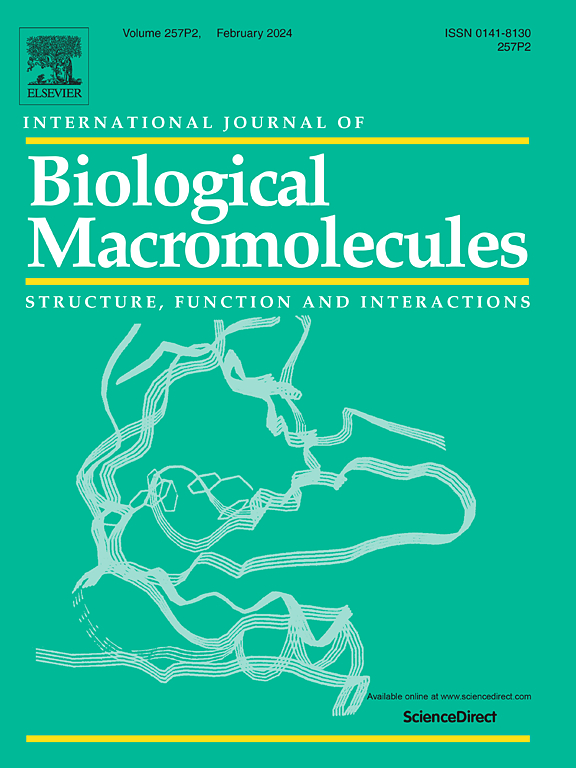载入功能性药物的壳聚糖微载体用于体外刺激成骨和血管生成。
IF 8.5
1区 化学
Q1 BIOCHEMISTRY & MOLECULAR BIOLOGY
International Journal of Biological Macromolecules
Pub Date : 2024-12-01
DOI:10.1016/j.ijbiomac.2024.137598
引用次数: 0
摘要
血管生成-骨生成耦合在骨再生中发挥着重要作用,因此,能够同时刺激骨生成和血管生成的生物材料在骨修复中具有重要影响。本文采用乳液相分离和浸渍法制备了负载功能性药物二甲基羟基甘氨酸(DMOG)的壳聚糖(CS)微载体,用于刺激骨生成和血管生成。傅立叶变换红外光谱和 zeta 电位分析证实,DMOG 主要通过物理吸附,尤其是氢键相互作用,成功载入 CS 微载体。随着DMOG浸渍浓度的增加,载入微载体的DMOG量也随之增加,而药物封装效率却有所下降。所有微载体的尺寸在 200 到 400 μm 之间,均呈准球形,具有相互连接的多孔结构,孔径主要在 15 到 30 μm 之间,适合细胞附着和增殖。在热重分析过程中,DMOG 的引入增加了微载体的残留量。CS/DMOG 微载体具有持续的药物释放能力(大于 19 天)和良好的降解能力。此外,CS/DMOG 微载体还支持干细胞粘附和增殖。通过加强碱性磷酸酶的表达和矿化,它们还能促进干细胞成骨。此外,它们还能促进血管生成,具体表现为刺激内皮细胞迁移和管道形成。这些结果表明,CS/DMOG微载体具有用于骨组织再生的潜力。本文章由计算机程序翻译,如有差异,请以英文原文为准。
Chitosan microcarriers loaded with functional drug for stimulating osteogenesis and angiogenesis in vitro
Angiogenesis-osteogenesis coupling plays important roles in bone regeneration; therefore, biomaterials capable of stimulating both osteogenesis and angiogenesis show significant influence in bone repair. Herein, chitosan (CS) microcarriers loaded with functional drug dimethyloxalylglycine (DMOG) were prepared using the emulsion phase separation and impregnation method for stimulating osteogenesis and angiogenesis. FTIR and zeta potential analyses confirmed successful DMOG loading into CS microcarriers, primarily through physical adsorption, particularly hydrogen-bond interaction. As the impregnation concentration of DMOG increased, the amounts of DMOG loaded into the microcarriers increased, while the drug encapsulation efficiency decreased. All microcarriers, ranging in size from 200 to 400 μm, revealed quasi-spherical shapes and an interconnected porous structure with pore sizes mainly between 15 and 30 μm, suitable for cell attachment and proliferation. The introduction of DMOG increased the residues of the microcarriers during thermogravimetric analysis. CS/DMOG microcarriers exhibited sustained drug release (for >19 days) and good degradation ability. Furthermore, CS/DMOG microcarriers supported stem cell adhesion and proliferation. They also enhanced stem cell osteogenesis verified by strengthening alkaline phosphatase expression and mineralization. Moreover, they promoted angiogenesis, as evidenced by stimulating endothelial cell migration and tube formation. These results suggest that CS/DMOG microcarriers have the potential to be used for bone tissue regeneration.
求助全文
通过发布文献求助,成功后即可免费获取论文全文。
去求助
来源期刊
CiteScore
13.70
自引率
9.80%
发文量
2728
审稿时长
64 days
期刊介绍:
The International Journal of Biological Macromolecules is a well-established international journal dedicated to research on the chemical and biological aspects of natural macromolecules. Focusing on proteins, macromolecular carbohydrates, glycoproteins, proteoglycans, lignins, biological poly-acids, and nucleic acids, the journal presents the latest findings in molecular structure, properties, biological activities, interactions, modifications, and functional properties. Papers must offer new and novel insights, encompassing related model systems, structural conformational studies, theoretical developments, and analytical techniques. Each paper is required to primarily focus on at least one named biological macromolecule, reflected in the title, abstract, and text.

 求助内容:
求助内容: 应助结果提醒方式:
应助结果提醒方式:


